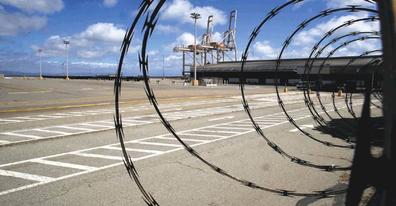Auto importer to help Pier 80 roar back to life

Article courtesy of San Francisco Chronicle [1]
By J.K. Dineen
For the first time in years, San Francisco’s Pier 80 — which in recent months has been the site of an emergency homeless shelter — will revert to its intended purpose: a working cargo terminal.
The Port of San Francisco has reached a deal with Pasha Automotive Services, which will use the facility to import as many as 150,000 automobiles a year, mostly from factories in Mexico, but also from Asia and Europe. It could also serve as an export hub for Tesla Motors, which manufactures its high-end electric cars in Fremont.
John Pasha, senior vice president of Pasha Automotive Services, said while it would take several years to reach full capacity, the terminal could eventually handle 96 ships annually and employ 50 longshoremen, as well as 150 processors, who prepare the cars for dealers. The first ships could start steaming into Pier 80 this fall.
Pier 80 is the city’s primary cargo terminal, a 60-acre facility with two warehouses and four deepwater berths between 25th Street and the north side of the Islais Creek Channel. Cargo volumes at Pier 80 have been declining since the economic slowdown of 2008. Vessel calls dropped from 20 in the 2010-11 fiscal year to eight last year, when the terminal handled about 3,000 tons.
No ships have used the pier this year.
“It’s been several years since we had much work at Pier 80 — we’re really excited to have more work over there,” said Ed Ferris, president of the International Longshore and Warehouse Union President Local 10.
Good news for workers
The timing is fortunate for Bay Area longshore workers. In January, Ports America, which runs operations at dozens of U.S. ports, said it would terminate a 50-year lease with the Port of Oakland and cease cargo operations in Oakland’s Outer Harbor Terminal.
“That caused about 100 people to lose steady positions and come back to the hall,” Ferris said. “It’s been a little slow this quarter.”
Along with the dry-dock, ship-repair facility at Pier 70 and the aggregate rock facility at Pier 94, the Pasha operation represents a modest revival of activity at a port that has long been in decline. At Pier 70, BAE Systems employs an average of 250 skilled workers year-round in its ship repair operation, representing 10 local trade unions, plus additional jobs during peak periods, where employment levels can rise to more than 1,000 people.
“For a city searching for economic diversity, these are thousands of jobs from 10 marine unions,” Peter Dailey, maritime director for the Port of San Francisco, said of the shipping activity on the southern waterfront. “Those jobs provide variety in terms of our economy in San Francisco. “There is a lot going on down there, but people don’t see it.”
Business is brisk
In addition to automobiles, Pasha will use the pier for cargo pieces that are too large to fit into normal shipping containers, Dailey said. In 2015, Pasha Automotive Services’ marine terminals processed more than 420,000 vehicles in Southern California and Washington state. Terminals on the West Coast are congested because of historically high numbers of cars coming into the country. Some of those terminals handling automobiles, including Pasha’s 200-acre terminal in San Diego, are starting to fill up.
Benicia and Richmond both have piers that handle auto imports.
“Richmond has automobiles coming out of their ears,” Dailey said. “A lot of ports are at capacity — and here we have 60 acres of projected marine terminal, with deep berths right in San Francisco, in the middle of the fifth-largest metropolitan area in the country.”
For the Pasha family, the move to Pier 80 represents something of a homecoming. Pasha started with a Flying A gas station at Bay Street and Van Ness Avenue in 1941. In 1960, it opened the first independent automotive port processing plant in the country at nearby Fort Mason.
When the company outgrew the Fort Mason property, the two automotive entities relocated to the Port of Richmond in 1971, at the same time establishing a processing facility at Terminal Island near Los Angeles.
“We are extremely proud to return to our roots in San Francisco and make both my grandfather’s and my father’s dreams a reality,” said Pasha.
Homeless shelter at site
Meanwhile about 50 homeless people remain at Pier 80, according to Sam Dodge, director of Mayor Ed Lee’s office of Housing Opportunity, Partnerships & Engagement. The “low threshold” shelter was established to create a place where the homeless could bring all their possessions — the pets and carts and bikes that traditional shelters don’t have room for. Dodge said Pier 80 was “quiet and peaceful but not an ideal location for the shelter.”
“Our intention is to use these spaces in the interim and be out of there when it’s ready for other uses,” Dodge said. “We don’t want to get in the way of all those IBEW jobs.” The shelter is expected to close by July 1.
